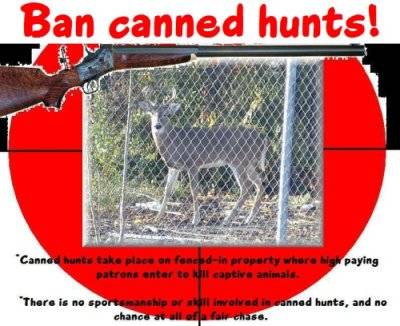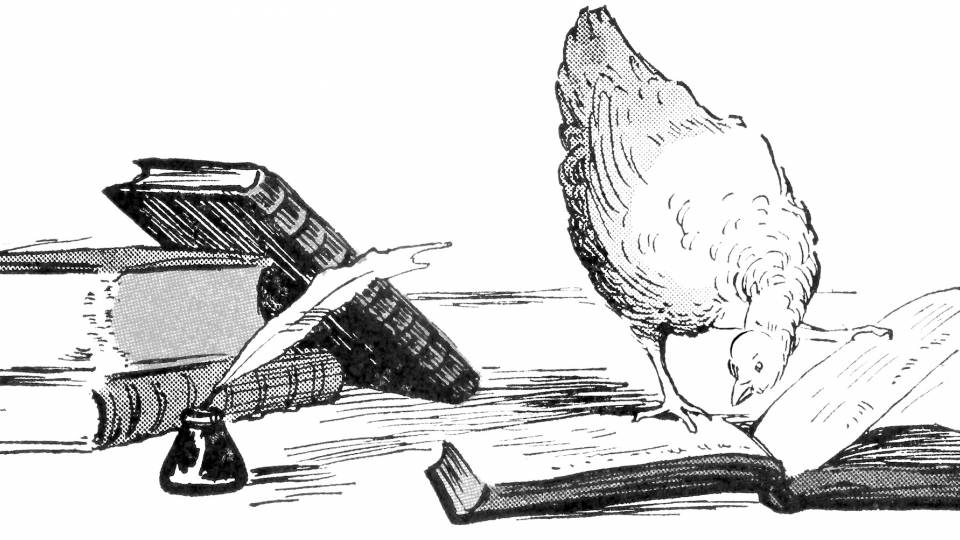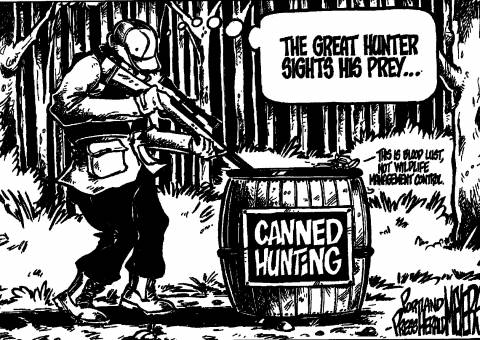LD 1068 “An Act To Ban the Killing of Animals in an Enclosed Area”
MFOA submittted legislation in 1999 that the current law on “hunting ranches” is base upon, which is not being enforced by the Maine Department of Agriculture.
Help Pass MFOA Legislation
• Know talking points for the bill. Review bill Fact Sheet
• Share information on your social media
• Write a letter-to-the-editor in local newspapers (250 words)
• Use similar letter to write / email your State Representative and Senator
Be concise, state the bill name and LD#, what the bill will do, and briefly why you want him/her to support its passage.
• Once the bill gets out of committee, email your State Representative and Senator and remind them of your earlier letter / email and urge support
• Write and submit testimony for the public hearing (www.mfoa.net - MFOA in Action - Activism and Programs - Activism and Programs - How to be a Legislative Activist)
• Speak at the public hearing (see www.mfoa.net - MFOA in Action - Activism and Programs - How to be a Legislative Activist)
LD 1068 “An Act To Ban The Hunting of Animals in Enclosed Areas”
Sponsors: Sen. Ben Chipman, Portland and Rep. Vicki Doudera, Camden
Why Canned Hunting Should be Banned in Maine
MFOA Legislative Fact Sheet for LD 1068

- Non-native animals such as elk, red deer, fallow deer, bison, and wild boar are domestically raised, and have lost much of their instinctive fear of humans. Guides often assist mostly out-of-state ‘trophy’ hunters in fenced acreage, thereby manipulating the odds against the animal, to ensure the hunters success with an often “no kill, no bill” guarantee.
- The majority of hunters, as well as respected national hunting groups, are against these operations and consider them unethical, void of fair chase traditions, and a threat to the image of Maine hunting. It is morally and ethically wrong to enclose animals and charge fees to kill them.
- These facilities are not subject to wildlife laws. Customers are most likely weekend hunters who do not have to have a license or gun handling experience. There is no age limit or bag limit. You can hunt year-round, even on Sundays, which is illegal in Maine for licensed hunters. Clearly a hunting outlier.
- Canned hunting is a not a primary source of income and minor portion of the owner’s operation and revenue. All ranches have deer farms and/or guiding services for hunting multiple species. Facilities also make revenue in lodging, meals, butchering and taxidermy, specialized guiding, fishing, moose and bird photography, trips, snowmobiling and canoeing. Canned hunting is a minor diminishing source of revenue. Labeling this legislation as an economic hardship is not factual.
- There were eleven such operations in 1999, today there are six. It is essentially a very small and dying industry that never caught on in Maine. The Department of Agriculture reported in 2007 there were only 192 animals “harvested” in total by the eleven canned hunting ranches. MFOA’s request for current data on the remaining six ranches is pending.
- Canned hunting only began in Maine in the 1990s, and was a controversial issue in the legislature in 1999, 2003 and 2009. Owners knew it was risky venture, and yet they still have multiple opportunities to create a more acceptable and profitable business model, including moving more into more non-consumptive activities as mentioned above, which many already provide. This is not an anti-business bill, but an opportunity to be more financially viable in the future. One example is Hindsite Hunt Preserve that in 2016 closed the hunting ranch due to low revenue and converted the property into a successful medical marijuana business. At a minimum, this bill creates an opportunity for the property owner to enhance multiple, already existing, revenue streams.
- Proposed legislation provides a two-year phase out period to help mitigate any financial loss and provide time to sell the remaining animals and reconfigure fencing for their existing deer farm or to sell to dog kennels, commercial fencing contractors, prisons, farms or as scrap metal.
- Historic precedent and recent case law refute that this is a property rights issue. We have laws protecting us from people who do not adhere to a core of ethics established by society. The same values can be used in accepting whether or not this activity is morally and ethically acceptable just like banning dog fighting and Sunday hunting. Property owners have multiple alternatives for the property that are far more acceptable to societal norms.
- The kill can be unnecessarily inhumane. True hunters take pride in the chase and the skill to drop the animal with one clean shot. These hunters are often inexperienced, therefore increasing the unlikelihood of a clean kill. In many cases the animals are repeatedly body wounded with bullets or arrows, bleeding out in pain, either by inaccuracy and/or the shooter does not want to damage the ‘trophy’ head. This is seen by a broad spectrum of hunters and non-hunters as unnecessarily inhumane and a bloodsport that has no place in Maine.
- Maine Inland Fisheries and Wildlife professionals contend that the non-native animals are captive. Thus, instead of being a wild species, the animals should be regarded as domestic — like cattle — and therefore is administered, licensed and inspected by the Agriculture Department, which is innately not part of the Department’s mission. The Department receives very minor revenue in licensing and tag fees from them.
- Twenty states have taken action against canned hunting, most are in a few states, with Texas having half of them. A Field and Stream poll of its readers revealed that just 12% of them approved of the practice. This activity was denounced by the Izaak Walton League and the Boone & Crocket Club, as well as by several prominent Maine leaders during the 2009 legislation including then Governor John Baldacci, IF&W Committee Chair, Matt Dunlop, IF&W Commissioner, Lee Perry and SAM Director George Smith.
- Eighteen states with active hunting ranches have documented chronic wasting disease, which can be deadly to Maine native deer species. Outbreaks can be caused by the mingling of captive and wild animals.
- This bill is not anti-hunting legislation nor some animal rights agenda to end hunting. It is, quite simply, a bill that takes a moral stand on a particular type of activity, which the vast majority of the public AND hunters oppose. Proponents of this legislation are against egregious forms of animal abuse. Captive hunting falls into that category.
Maine Friends of Animals - 190 US Route 1, Falmouth, ME www.mfoa.net
MAINE HUNTERS AGAINST CANNED HUNTING
JOIN TODAY!
MFOA letter / email to Maine Hunters Against Canned Hunting supporters:
Thank you for signing on to our Maine Hunters Against Canned Hunting list. LD 1068, “An Act to Prohibit Killing Animals in Enclosed Areas”, is coming before the legislature soon. A critical part of getting it passed is the support of hunters like yourself, who are willing to speak up about something they believe is wrong. It is morally and ethically wrong to enclose animals and charge fees to kill them. The vast majority of hunters consider these “hunting” ranches unethical, void of fair chase, and a threat to the image of hunting in Maine. In fact, a Field & Stream poll revealed that just 12% of its readers approved of the practice.
These sites are not subject to wildlife laws. Customers are most likely inexperienced out-of-state weekend hunters who do not have to have a license or gun handling experience. There is no age limit or bag limit. You can hunt year-round, even on Sundays, which is illegal in Maine for license hunters. Clearly, this practice is hunting outlier. Find out much more on our LD 1068 Fact Sheet: https://mfoa.net/wildlife/mfoa’s-major-legislation-131st-legislature.
Our challenge is to get as a many hunters like yourself to sign on to this list, so please pass the word along. The bill could come up for its hearing in Augusta at any time. Maine Hunters Against Canned Hunting is the biggest political piece of passing this legislation. The more hunters we get to support this bill, the stronger our case for what a “hunting” outlier canned hunting really is.
It is most important your voice be heard! In addition to signing the Maine Hunters Against Canned Hunting list, you can really help by emailing your State Representative and Senator asking them to support LD 1068. Find the contact information for your Representative at https://legislature.maine.gov/house and your Senator at https://legislature.maine.gov/senate.
Please submit testimony, written, Zoom or in person!
Please submit written testimony by going to https://legislature.maine.gov, at the bottom of the page, click on ‘Testimony Submission’, then click on ‘Public Hearing’, which will open up to ‘Choose Committee’. Select ‘Committee on Agriculture, Conservation and Forestry’, then choose the date of the hearing (coming soon). Then check LD 1068 “An Act to Prohibit Killing Animals in Enclosed Areas” and enter your testimony, which can be cut and pasted as a document. Complete the rest of the form and submit. Your testimony won’t be online until the hearing.
If you want to testify remotely, click on ‘I would like to testify electronically over Zoom’. You will be sent a link for the meeting, but must enter your testimony and submit it as described above. Zoom testifying is easy, but it is limited to three minutes, as is in person testifying.
The best way is to testify is in person at the hearing. If you prefer to attend the hearing in Augusta go to our website at https://mfoa.net/activism-programs/what-you-need-know-be-legislative-activist for guidelines. We will email you once we know the hearing date and time.
Again, thank you for signing our Maine Hunters Against Canned Hunting list. I will be in touch, but please talk to other hunters and encourage them to add their name and pass the word, too. Just have them send their name and email to info@mfoa.net. And we will follow up. Together we will end this inhumane practice that has no place in Maine’s hunting heritage.



